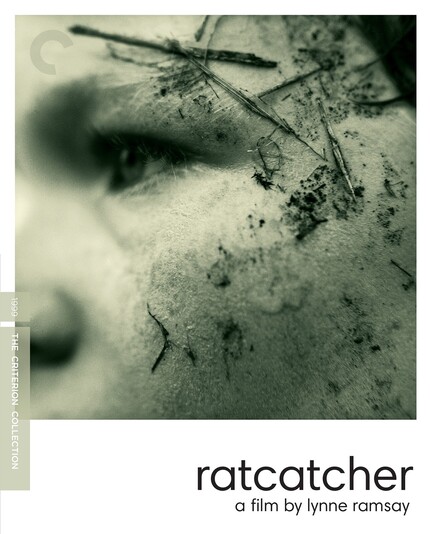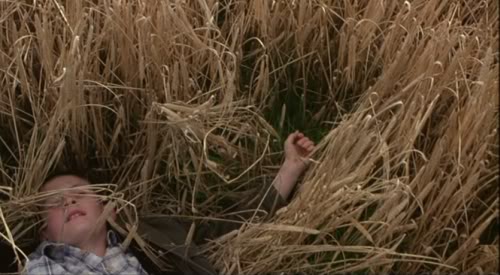Blu-ray Review: RATCATCHER, Criterion Returns Us to A Child's Life in Glasgow

A boy wrapping himself in lace curtains. Garbage bags piled in the streets. Tom Jones on the telly. A filthy canal that doubles as a death trap. A mouse tied to a balloon. Bullies hiding 'round the corner. A house in the country. These images and more form a poetic whole that is Ratcatcher, the first feature film by (now) renowned filmmaker Lynne Ramsay. With a new lease of proverbial life on Criterion, and considering the development and variety of her career, it's a good time to revisit the film that introduced us to her voice.
Set during the garbage strike in Glasgow in 1973, it's a coming-of-age film that looks at the turning point in the life of James, 12 years old, still a child but seeing things through maturing eyes, in a world that is also set for change. While new housing is being built, he and his neighbours are still forced to live in squalid housing (and be blamed for its lack of upkeep). The streets are filled with rat-infested trash, his father is often indifferent and violent, their home is falling apart, and his one friend is gone. Somehow James knows that if things don't change, he'll end up stuck like his father and other men, and he knows he doesn't want that.
Heralded as part of the new wave of British Social Realism, Ramsay looks at this life in Glasgow almost as a series of poetic vignettes, short stories of moments in these few weeks of James' life. When we first meet him, his first act, causing a terrible accident, follows him through these moments, as he tries to make sense of what he's done and what it means he'll become. He's not quite sure what to make of the world he lives in, especially once he escapes its few blocks to the housing development his family will soon be moving to, he finds a world of fresh air and light, devoid of people who love him and those who abuse him, where he can still find joy in being a child.
Ramsay did not shy away from political subjects; but they are viewed through James' eyes. We can see how his mother and other women are treated, always expected to look after the children, to be maid, mother, and prostitute, even if their husbands are home, and how the young neighbourhood girl, so desparate for any form of attention and affection, allows herself to be abused by the local teenage boy bullies. The bureaucrats who have no empathy for the hardships of the poor and working class.
But in between this is moments of love; James' love for his mother in his small gestures of care; the constant guilt over the death of his friend; finding kindred spririts in other children like him, those who have care and understanding, even if they seem strange to outsiders. Ramsay finds a delicate rhythm to her story, eschewing traditional social realism methods for telling the truth slant, finding a different approach and understanding, in a way that continues to influence the new wave.
SPECIAL FEATURES
One of the reasons many of us cinephiles love Criterion is the amazing restoration work done on the films, a not always easy task given the diversity of formats and the constant change in technology. So to have not only the restoration of this gorgeous film, but to have the restoration overseen by Ramsay herself, and cinematographer Alwin Küchler, means we are spoiled for quality. While Küchler did not shy away from showing the drabness of this run-down Glasgow neighbourhood, that doesn't mean the film itself looks drab, more that it's brough to life, a place where people exist in their red coats, blue jumpers, red balloons, even the piles of black garbage bags stand out in the story where people find colour and beauty because they have to. The scenes of the wheat fields, where James finds a moment of solitary joy, connects us to his world and experience, its tactile nature as he is a child still learning about the world.
It's a treat to have not just one but two interviews with Ramsay. One from 2002, when the film was first issued on disc by Criterion, and Ramsay was still young and fresh, still somewhat starry-eyed yet humble about her (deserved) accolades, and eager to discuss the struggles to make the film with a small budget but dedicated crew. The second, from this year, shows a still fresh but now seasoned Ramsay, amazed at how her crew pulled it off, still humble at how others helped her tell her story, and still with a quick wit and keen eye for stories of the underdogs that she continues to champion. The audio interview with Küchler, however, is the real treasure; he goes through the painstaking process of how he figured out the photography of Ratcatcher, which was only the second feature he worked on, and also his process as a cinematographer, what that position means in the storytelling process. It's a must listen for any budding cinematographer, to have that insider perspective.
Also includes are Ramsay's three early shorts. Her first, Small Deaths, was her film school graduation film, and won a jury prize at Cannes. The other two, Kill the Day and Gasman, are also award winners, and showcase that would evolve first in Ratcatcher and Morvern Callar, and it's a great way to see how a filmmaker evolves in style and content.
My favourite part of a Criterion release, apart from the restoration, is the essays, and as usual, I was not disappointed. 'A Flashlight Cinema' by Girish Shambu gives great insight into the poetic nature of Ramsay's cinema. It shows how Ramsay, even though heralded as the British social realism new wave, is indeed a Scottish filmmaker, finding a different perspective on that kind of realism in combining the surreal and the real, stemming from her interest in photography. But perhaps the more intimate recollection of Barry Jenkins is the highlight: he tells how he bought the first edition of the Criterion, when he had little money, but had been inspired when meeting the filmmaker, who told stories of a white kid in Glasgow, that growing up Black in Florida, didn't feel all that different. This essay combines a professional and personal perspective that tugs at the creative heart.
Ratcatcher
Director(s)
- Lynne Ramsay
Writer(s)
- Lynne Ramsay
Cast
- Tommy Flanagan
- Mandy Matthews
- William Eadie








